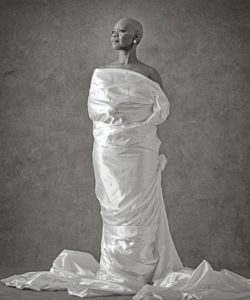Irma Thomas
R&B singer Irma Thomas, hailed as the "Soul Queen of New Orleans" has been performing and recording since the 1950s.

Courtesy of Rick Olivier.
Rick Olivier is acclaimed for capturing compelling and original images of Louisiana musicians, such as "Irma Thomas," a silver gelatin photograph made in 1995, measuring 11 x 14 inches.
Affectionately referred to as the “Soul Queen of New Orleans,” Grammy Award-winning singer Irma Thomas has recorded, written, and performed R&B, jazz, blues, gospel, and soul in her trademark emotive style for more than five decades.
Born Irma Lee on February 18, 1941, to Percy and Vadar Lee in Ponchatoula, Louisiana, Irma moved with her parents when she was three years old to finally settle on Melpomene Street in Uptown New Orleans. Growing up, she demonstrated singing talent at the Mission Baptist Church and went on to perform in school talent shows and at school dances in an era that launched many R&B stars from similarly inauspicious settings: Deacon John and the Ivories, Ernie K-Doe, Frankie Ford, and Benny “Fortune Teller” Spellman. By the end of her teens, however, she had been married twice, given birth to three children (her first at age fifteen, which, she says, prompted a “shotgun wedding”), and struggled through a series of dead-end jobs. Thomas has said that she made the decision in 1958 to sing professionally more out of necessity than choice.
Her first big break came when bandleader Tommy Ridgley introduced her to Joe Ruffino at Ron Records, where she cut Dorothy LaBostrie’s “(You Can Have My Husband But) Don’t Mess With My Man,” which reached the national R&B chart in 1960. Soon after, Allen Toussaint asked her to join Minit Records, where writing and recording sessions were a healing force for Thomas. The singer would go on to record a string of hits for Minit, including “It’s Raining,” which was written by Toussaint and remains a fan favorite. In 1963 Imperial Records acquired Minit, and the hits kept coming for Thomas, including perhaps her other most beloved track, “Breakaway,” as well as “Time Is On My Side,” the B-side to 1964’s “Anyone Who Knows What Love Is.” The popularity of the Rolling Stones’ recording of “Time is On My Side” in 1964—considered by many critics to be a nearly note-for-note replica of Thomas’s version—would go on to eclipse her recording in the annals of rock ’n’ roll history.
After Imperial Records bought Thomas’s contract from Minit, Thomas wrote and recorded her best-selling track to date, “Wish Someone Would Care.” Throughout the 1960s, Thomas continued to travel extensively with her band, The Tornados, opening for such artists as Otis Redding and James Brown. While she is widely recognized for her hit songs and her distinctive and emotive vocal delivery, Thomas is also a beloved figure to generations of New Orleanians for her character, her down-to-earth personality that resonates with many who admire her rise to fame from humble beginnings, and her community work. Since 1974 she has appeared at every New Orleans Jazz & Heritage Festival, where she often performs a tribute concert to gospel singer Mahalia Jackson. Every year since 1983, she has performed her annual Mother’s Day concert at the Audubon Zoo.
After Hurricane Camille struck New Orleans and the Gulf South in 1969, Thomas moved her family to Los Angeles, California. She soon returned to New Orleans, where she built a devoted local following. In 1986 she signed with Rounder Records and in the 1990s opened her own nightclub called The Lion’s Den, which was irreparably damaged by Hurricane Katrina and never reopened. After two nominations for previous projects, Thomas’s post-Katrina album After The Rain won a Grammy in 2007 for Best Contemporary Blues Album, a long overdue accolade for a singer who never had a million-seller. Thomas was inducted into the Louisiana Music Hall of Fame the same year and was chosen by NPR listeners as one of the 50 Great Voices of all time in 2011.
After more than five decades as a performing artist, Thomas told the New Orleans Times-Picayune in 2013, “A lot of folks who are in this business at [my] age, their voices are on the way out the door. They’re straining to get a halfway decent note out. I’m blessed. I don’t have that problem. In fact, I’m finding that my voice seems to be getting a little stronger. I’m able to hit notes that I didn’t think I could hit. Maturity helps. I’m thankful that I’m still capable.”
